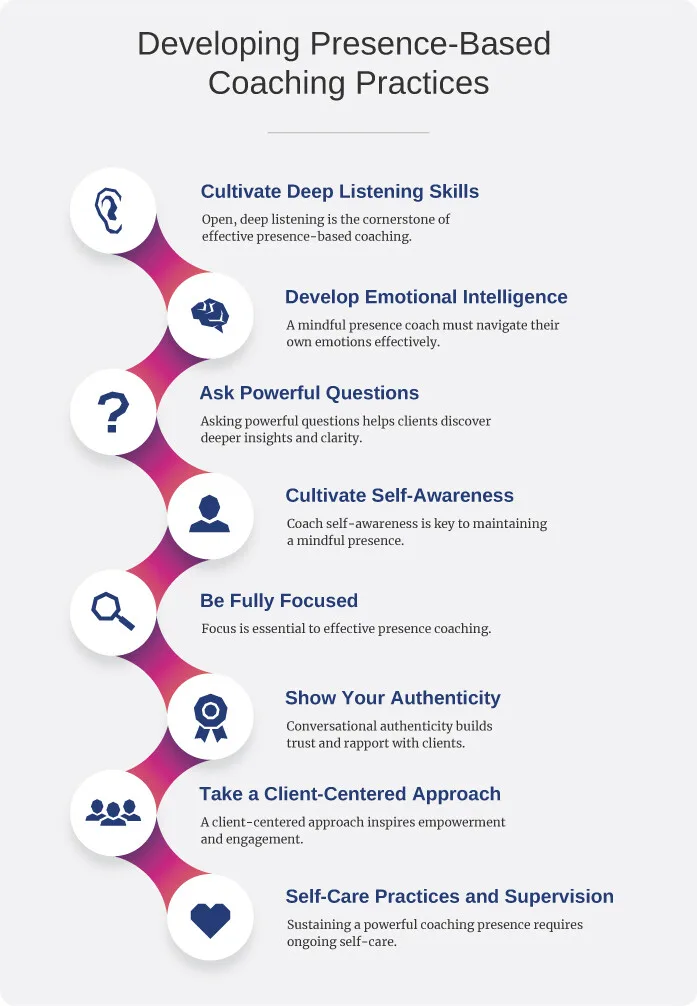A powerful coaching presence goes a long way in establishing meaningful and effective coaching sessions and relationships. From day one, a coach’s ability to be fully present and engaged with their clients can build trust, encourage openness, and yield impactful results.
Coaches at all levels of experience benefit from refining their skills. If you are a new or growing coach, understanding how to develop a coaching presence to engage the whole person is essential for your long-term success in helping clients achieve their desired results.
What Is “Coaching Presence”?
At its core, coaching presence is the ability to be fully engaged, attentive, and responsive to a client during a coaching session. In presence-based coaching, the coach brings their full self to the session, remaining attuned to the client’s emotions, thoughts, and expressions, ultimately creating a space of trust and openness. According to the International Coaching Federation (ICF), coaching presence is a critical competency that involves being fully conscious and engaged, able to hear what is said and left unsaid.
Knowing How to Be Present Is Essential During Sessions
Being present is crucial for fruitful coaching sessions. Below are a few reasons it matters so highly:
- Builds trust. Clients feel seen, heard, and valued when their coach is mindfully present.
- Invites openness. Creates a safe space for clients to share their thoughts and emotions freely.
- Increases effective communication. Active listening on multiple levels leads to better understanding and connection.
- Supports co-creation. A strong coaching presence enables collaboration and co-creation of solutions.
- Ensures long-term impact. Clients increasingly achieve their goals with a consistently present and engaged coach.
Key Steps to Develop Presence-Based Coaching Practices
Building a powerful coaching presence requires intentional practice and self-awareness. Below are steps to help you cultivate a mindful presence in your coaching practice.

Cultivate Deep Listening Skills
Open, deep listening is the cornerstone of effective presence-based coaching. Here’s how you can enhance this skill in your practice:
- Practice active silence, allowing clients to express themselves fully
- Observe non-verbal cues, including body language and tone
- Avoid interrupting, and give clients space to examine and articulate their thoughts
- Integrate curiosity and interest, asking follow-up questions to deepen the conversation
- Resist the urge to provide immediate solutions, allowing client insights to emerge naturally
Develop Emotional Intelligence
A mindful presence coach must navigate their own emotions effectively. Developing emotional intelligence includes:
- Practicing empathy to understand clients’ experiences without judgment
- Maintaining composure, especially when clients express strong emotions
- Managing stress to remain calm, engaged, and focused
- Regulating personal emotions, ensuring they do not interfere with the session
- Engaging in self-reflection, recognizing personal triggers and biases
- Developing as an embodied leader, reclaiming connection to all the nuances of their true selves
Ask Powerful Questions
Asking powerful questions helps clients discover deeper insights and clarity. Here’s how you can practice and develop this skill:
- Use open-ended questions that encourage self-exploration
- Challenge assumptions and shame stories, helping clients reframe their perspectives
- Develop timing sensitivity, knowing when to probe deeper
- Encourage reflection by asking what, how, and why questions
- Pause after a question, allowing clients time to think and respond
- Receive their answers, not answering the questions for them
Explore Co-Active’s Toolkit to unlock ideas for powerful questions.
Cultivate Self-Awareness
Coach self-awareness is key to maintaining a mindful presence. Here’s what you can do to enhance it:
- Engage in mindfulness or meditation to enhance focus
- Find pre-session practices to help you relax and be open and present
- Seek feedback from mentors or peers
- Identify blind spots in your coaching process
- Journal regularly, reflecting on coaching experiences, triggers, and successes
- Commit to personal growth, continuously evolving your coaching approach
Be Fully Focused
Focus is essential to effective presence coaching. Below are some helpful strategies:
- Eliminate distractions
- Align with session goals
- Embody the session
- Coach the whole person
- Balance intuition with objectivity
Show Your Authenticity
Conversational authenticity builds trust and rapport with clients. Ways to enhance authenticity and develop deeper conversation include:
- Vulnerably sharing relevant personal experiences when appropriate
- Avoiding an artificial coaching persona while staying true to yourself
- Communicating naturally, following your unique style
- Being honest about limitations and valuing transparency
CTI learner testimonial: “My perspective and outlook on how to hold a conversation have changed and I know that will affect how I behave, react, and respond to others.”
Take a Client-Centered Approach
A client-centered approach inspires empowerment and engagement. Implementing this strategy involves the following:
- Keeping client goals central by individualizing each session
- Adjusting coaching styles to meet the client’s unique needs
- Avoiding imposition, allowing clients to co-create their solutions
- Celebrating progress, recognizing even small victories
- Empowering clients, reinforcing their capability for embodiment and growth
Self-Care Practices and Supervision
Sustaining a powerful coaching presence requires ongoing self-care. Important practices to build into your work include:
- Engaging in meditation, prayer, or mindfulness to stay grounded
- Coaching clients in alignment with core values
- Journaling about coaching experiences for self-reflection
- Investing in professional development through reading and courses
- Maintaining physical health habits to sustain vitality and focus
- Seeking supervision and feedback from mentors or professional networks
Develop Presence-Based Coaching With Co-Active
Developing presence-based coaching requires commitment, self-awareness, and evolving practice. Coaches focusing on deep listening, emotional intelligence, authenticity, and client-centered approaches align with their values and create meaningful connections and lasting impact. Presence-based coaching is a journey that evolves with time and experience, yielding greater client transformation and increased coach satisfaction.
Explore the free Co-Active Toolkit today for more insights and tools on coaching presence.

